九年级英语下册module2educationunit3languageinuse习题课件9
- 格式:ppt
- 大小:3.78 MB
- 文档页数:30

Module 2 Education Unit 3 Language in use【学习目标】知识目标:能默写本模块重要单词和短语能力目标:能读懂文章内容并能完成相关习题。
情感目标:通过学习学校生活,能描述自己的学校生活。
【重点难点】1、能读懂文章内容并能完成相关习题。
2、能掌握代词和介词的用法。
【学习步骤】环节一:夯实基础,巩固落实1. one, it, that 用来指代前面出现过的名词的区别。
1. There is a photo on the wall, it was taken by Tony.2. Lily likes cartoon films, while Lucy likes funny ones.3. The population in China is larger than that in India.通过观察上面的三个例句我们可以看出,it指________________________。
One 指__________________________。
That 指____________________________。
2. another,other,the other,others,the others 用法的区别。
another 用来泛指其他的任意一个事物。
other 用来泛指其他的任意一些事物。
the other 用来特指另一个或另外的所有事物。
一般如果当我们没有提前给出范围时用________,而如果提前给出了范围则用________。
如果我们将他们所修饰的名词省略掉则用_______ 或_________。
请用上面的词完成下面的句子。
1. I have two sons, one is eleven, _________ is thirteen.2. This kind of sandwich is quite delicious, could I have ________ one?3. Some students like watching films, ________ like playing sports.3. both, either, neither, all, noneBoth 指_______________, either 指________________, neither指________________。

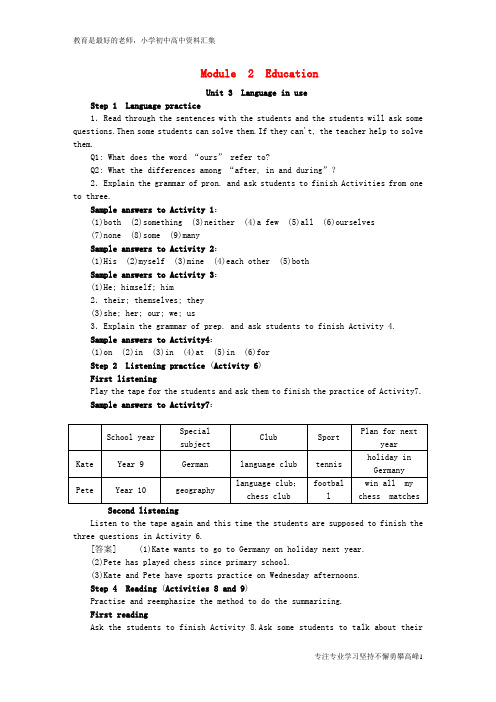
Module 2 EducationUnit 3Language in useStep 1Language practice1.Read through the sentences with the students and the students will ask some questions.Then some students can solve them.If they can't, the teacher help to solve them.Q1: What does the word “ours” refer to?Q2: What the differences among “after, in and during”?2.Explain the grammar of pron. and ask students to finish Activities from one to three.Sample answers to Activity 1:(1)both (2)something (3)neither (4)a few (5)all (6)ourselves(7)none (8)some (9)manySample answers to Activity 2:(1)His (2)myself (3)mine (4)each other (5)bothSample answers to Activity 3:(1)He; himself; him2.their; themselves; they(3)she; her; our; we; us3.Explain the grammar of prep. and ask students to finish Activity 4.Sample answers to Activity4:(1)on (2)in (3)in (4)at (5)in (6)forStep 2Listening practice (Activity 6)First listeningPlay the tape for the students and ask them to finish the practice of Activity7.Sample answers to Activity7:Listen to the tape again and this time the students are supposed to finish the three questions in Activity 6.[答案] (1)Kate wants to go to Germany on holiday next year.(2)Pete has played chess since primary school.(3)Kate and Pete have sports practice on Wednesday afternoons.Step 4Reading (Activities 8 and 9)Practise and reemphasize the method to do the summarizing.First readingAsk the students to finish Activity 8.Ask some students to talk about theirsummarizing of each paragraph and then the teacher checks the answers.Sample answers to Activity 8:[答案] a) 3 b) 1 c) 4 d) 2Second readingRead the passage again and check the true sentences. (√)Sample answers to Activity 9:1.√ 4.√Step 5Around the worldT: Can you imagine the schools without teachers in the future? Maybe it will come true sooner or later. Let's look at the research studied by Professor Mitra.Step 6Homework1.Ask the students to think about their opinions on their present school lives and what they want in their school lives and so on.2.Finish the exercises of this module.Blackboard design寄宿学校的校规There are over 800 boarding(寄宿) schools in the UK with students from home and foreign countries. Boarding schools started hundreds of years ago in the country. But the earliest boarding schools were set up for white, rich boys only. Now both boys and girls can go to boarding schools from the age of 7 to 18.In the UK, boarding schools have three terms in a school year, with about 13 weeks in each term. Students study and live together. They can't go outside if they are not allowed to. In some schools, each student has his or her subject plan. Besides the usual classrooms and labs, the boarding schools have lots of other facilities for their students, including music rooms, boats,swimming pools, cinemas and theaters. Most boarding schools have a “light out” time. So when it's time to go to bed, all the lights in the bedrooms are turned off. There are housemasters to tak e care of students all the time, especially afterschool hours.Nearly all students at boarding schools wear a school uniform. Boys usually wear a shirt and a tie, and girls wear a white blouse, sometimes also a tie and a skirt. As students get older, the rules become less strict.In the UK, boarding schools provide students with delicious food. They can choose to have a full English breakfast or simply bread. For lunch and supper, they can choose a meal with or without meat. And there is always selfservic e for salad and dessert. Students can also make themselves something to eat at any time in a kitchen, or drink tea or have a snack between meals.。
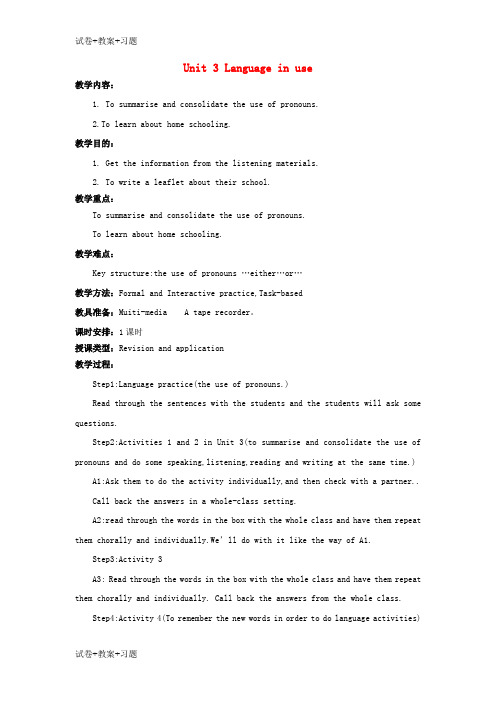
Unit 3 Language in use教学内容:1. To summarise and consolidate the use of pronouns.2.To learn about home schooling.教学目的:1. Get the information from the listening materials.2. To write a leaflet about their school.教学重点:To summarise and consolidate the use of pronouns.To learn about home schooling.教学难点:Key structure:the use of pronouns …either…or…教学方法:Formal and Interactive practice,Task-based教具准备:Muiti-media A tape recorder。
课时安排:1课时授课类型:Revision and application教学过程:Step1:Language practice(the use of pronouns.)Read through the sentences with the students and the students will ask some questions.Step2:Activities 1 and 2 in Unit 3(to summarise and consolidate the use of pronouns and do some speaking,listening,reading and writing at the same time.) A1:Ask them to do the activity individually,and then check with a partner..Call back the answers in a whole-class setting.A2:read through the words in the box with the whole class and have them repeat them chorally and individually.We’ll do with it like the way of A1.Step3:Activity 3A3: Read through the words in the box with the whole class and have them repeat them chorally and individually. Call back the answers from the whole class.Step4:Activity 4(To remember the new words in order to do language activities)A4:Read through the words in the box with the whole class and have them repeat them chorally and individually,then check with a partner.Call back the answers from the whole class.Ask the students to read the subjects.Step5:Activity 6 (Read the passage and say where you think it come from.) A6:The students will read it and make sure they can understand each phrases and then finish it on their own.Call back the answers from the whole class.Students work in pairs to practice the conversation.When they have done it once,they should change roles and do it again.Step6:Activities 7 and 8 (Do some reading)A7:Ask the students to do the activity individually,then check with a partner.In the end we call back the answers from the whole class.A8:Ask the students Ask the students to do this individually,then check with a partner.Call back the answers from the whole class.Step7:Around the worldRead it and know more about home schooling.Step8:Activity 9A9:Write a leaflet about your school.Homework:Finish the exercises in theworkbook Ex. 1, 2 & 3.。

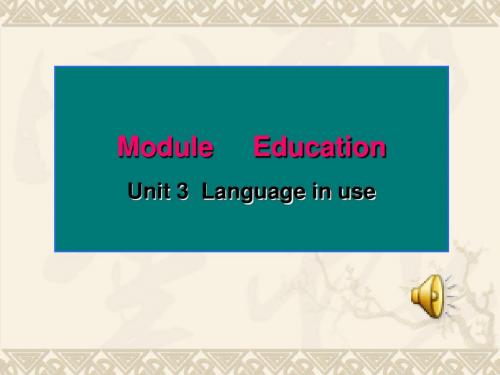

Unit3 Languageinuse基础知识回顾Ⅰ.根据句意用适当的介词填空1.These days I am busy with my project on pollution.2.My teacher was very angry with me because I was late for school again.3.Will you invite any friends to your thirteenth birthday party?4.How long has he worked as an English teacher?5.My uncle arrived at the train station on the morning of May 3.Ⅱ.用方框中所给单词的适当形式填空1.I did well in both English and Chinese last term.2.—What would you like,tea or coffee?—Neither .I’d just like a glass of water.3.—Can I use your pen,Kate?—OK.Here you are.But you can’t lend it to others.4.I tried several skirts on,but none of them looked good.5.Good news!We won first prize in the singing petition.Ⅲ.根据汉语意思完成句子,每空一词1.在帕克学校没有人学习汉语。
No one learns Chinese in Park School.2.午饭休息时间从12点到1点。
The lunch time is from 12:00 pm to 1:00 pm.3.课刚开始时,老师给我们讲了一个故事。

Module 2 Education导入:基本思路:M2U3 Language in use 第一课时I didn’t expect to do well in either maths or geography. 我没有指望数学或物理会考好。
【自主领悟】(1)expect 意为“期盼;盼望”,构成短语:expect to do sth. “期望做某事”(2)either…or…意为“要么……要么……;不是……就是……”,表示选择,用于连接两个并列的词或短语。
【归纳拓展】(1)expect的其它结构:except+名词 \ 代词“期盼某人 \ 某物”expect sb. to do sth. “期盼某人做某事”except + that 从句“盼望……”(2)either…or…的用法两注意:either…or…连接两个成分作主语时,谓语动词通常与其靠近的主语保持一致(即就近原则)。
例如:Either you or I am going theretomorrow. 明天要么你去那里,要么我去那里。
either…or…的否定式可以是not either…or…,也可以是neither…nor...。
活学活用① I expect _____ (see) you again.② Either you or your brother _____ (have) to stay at home.I. 根据句意及首字母提示完成单词1. I have a happy family and I r______ love my family.2. Bob saw two films last week, but he liked n______ of them.A. sweet somethingB. something sweetC. some sweetD. anything sweet3. G______ is a subject about the world.4. We do experiment in the l _______.II. 由所给词的适当形式填空1. It’s a good habit _____ (take) a walk after supper.2. The telephone _____ (ring) while I _____ (read) a book last night.3. Neither Nancy nor Miller _____ (stay) with foreigners before.4. The story told by grandma is as _____ (interest) as the one told by grandpa.5. Children like to swim in the _____ (swim) pool.III. 单项选择(10分)1. — Where did you lose your keys?— ____ in the classroom ____ at home. I’m not sure.A. Both; andB. Neither; norC. Either; orD. Not only; but also2. — How did you feel about the _____ news?—I’m very______ at it.A. surprising; surprisedB. surprised; surprisingC. surprising; surprisingD. surprised; surprised3. _____ the students is about 2, 000 in our school. And ______ of the students are fromthe countryside.A. A number of; A number ofB. The number of; The number ofC. The number of; A number ofD. A number of; The number of4. — I _____ a dictionary. May I borrow yours?— Sure. _____.A. have got; Here you areB. haven’t got; Give youC. don’t have got; Here you areD. haven’t got; Here you are.5. In the West, people like to finish a meal with _____.板书设计:课后反思:6. We will go for a picnic if it _______ this Sunday.A. isn’t rainingB. won’t rainC. doesn’t rainD. don’t rain7.— Do you need a new dictionary, Susan?— No, Mum. My uncle bought me ______ yesterday.A. oneB. itC. the oneD. anotherⅣ. 完成句子1. 我肯定你们会取得好成绩。

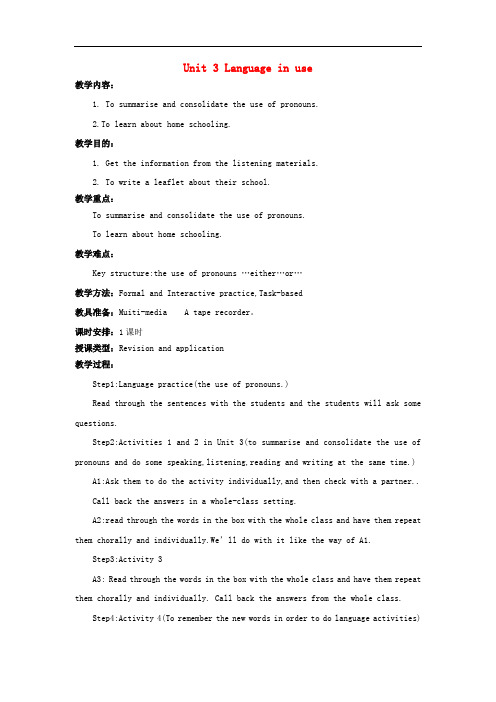
Unit 3 Language in use教学内容:1. To summarise and consolidate the use of pronouns.2.To learn about home schooling.教学目的:1. Get the information from the listening materials.2. To write a leaflet about their school.教学重点:To summarise and consolidate the use of pronouns.To learn about home schooling.教学难点:Key structure:the use of pronouns …either…or…教学方法:Formal and Interactive practice,Task-based教具准备:Muiti-media A tape recorder。
课时安排:1课时授课类型:Revision and application教学过程:Step1:Language practice(the use of pronouns.)Read through the sentences with the students and the students will ask some questions.Step2:Activities 1 and 2 in Unit 3(to summarise and consolidate the use of pronouns and do some speaking,listening,reading and writing at the same time.) A1:Ask them to do the activity individually,and then check with a partner..Call back the answers in a whole-class setting.A2:read through the words in the box with the whole class and have them repeat them chorally and individually.We’ll do with it like the way of A1.Step3:Activity 3A3: Read through the words in the box with the whole class and have them repeat them chorally and individually. Call back the answers from the whole class.Step4:Activity 4(To remember the new words in order to do language activities)A4:Read through the words in the box with the whole class and have them repeat them chorally and individually,then check with a partner.Call back the answers from the whole class.Ask the students to read the subjects.Step5:Activity 6 (Read the passage and say where you think it come from.) A6:The students will read it and make sure they can understand each phrases and then finish it on their own.Call back the answers from the whole class.Students work in pairs to practice the conversation.When they have done it once,they should change roles and do it again.Step6:Activities 7 and 8 (Do some reading)A7:Ask the students to do the activity individually,then check with a partner.In the end we call back the answers from the whole class.A8:Ask the students Ask the students to do this individually,then check with a partner.Call back the answers from the whole class.Step7:Around the worldRead it and know more about home schooling.Step8:Activity 9A9:Write a leaflet about your school.Homework:Finish the exercises in theworkbook Ex. 1, 2 & 3.。
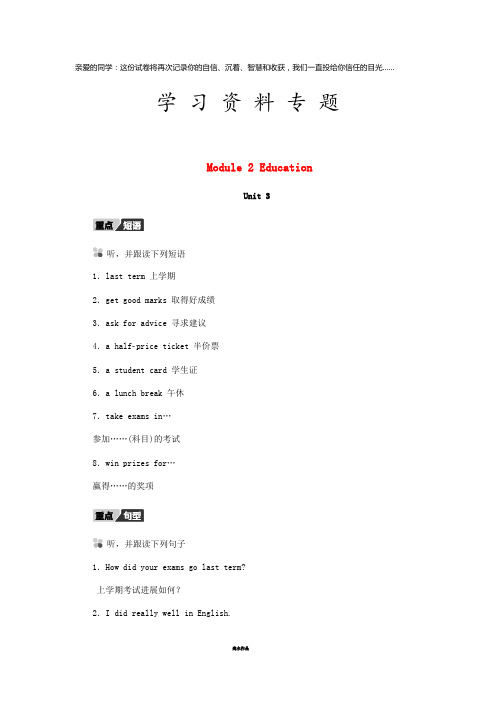
亲爱的同学:这份试卷将再次记录你的自信、沉着、智慧和收获,我们一直投给你信任的目光……
学习资料专题
Module 2 Education
Unit 3
听,并跟读下列短语
1.last term 上学期
2.get good marks 取得好成绩
3.ask for advice 寻求建议
4.a halfprice ticket 半价票
5.a student card 学生证
6.a lunch break 午休
7.take exams in…
参加……(科目)的考试
8.win prizes for…
赢得……的奖项
听,并跟读下列句子
1.How did your exams go last term?
上学期考试进展如何?
2.I did really well in English.
我的英语确实不错。
3.Please bring your student card if you want a cheap ticket.
如果你想得到一张便宜的票,请把你的学生证带来。
4.There are three fortyminute lessons, with a twentyminute break in between. 有三节40分钟的课,中间有20分钟的休息。
5.The lunch break is from 12 pm to 1 pm.
午间休息从12点到1点。